(David Harrison/M&G)
The impact of the pandemic of the last two years, particularly on small businesses, and a controversy surrounding fishing quotas was reason enough for the Mail & Guardian to visit West Coast fishing villages and try to meet local fishers who have had to navigate the pandemic and changing legislative tides.
By the end of the first day it became evident that 48 hours would not be enough either to take in the views or to adequately reflect the fishers who make use of the ocean to support themselves.
Small-scale fishers use the gifts of the ocean for survival, while commercial trawlers have to focus on economies of scale and profit. Irrespective, both are subject to fishing quotas that have decreased by at least 50% over four decades.
Whether it is a current affecting fish availability, or unfavourable weather conditions — for the fisher — nature ultimately has the final say over who will be the recipients of her bounty.
In two days, we met commercial fishers, aquatic farmers, small-scale fishers, poachers and nostalgic residents whose love affairs with the cold waters of the Cape show no signs of abating.
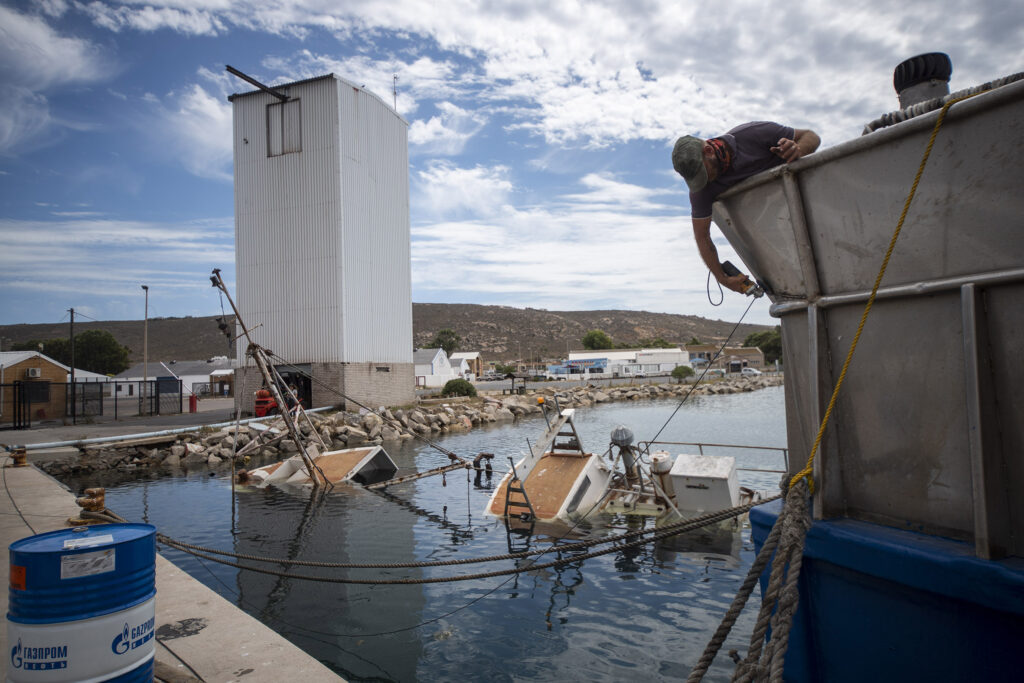 St Helena Bay harbour, where the boat Anna sank. (David Harrison/M&G)
St Helena Bay harbour, where the boat Anna sank. (David Harrison/M&G)
The West Coast has a profitable maritime industry and some of the world’s finest marine life but it is also an area where people and nature fight for survival.
 On these outcrops in Saldanha Bay Vernon Vraagom’s father taught him to swim 50 years ago. His father, a seasoned fisherman, told him that only two out of 10 fishermen knew how to swim. (David Harrison/M&G)
On these outcrops in Saldanha Bay Vernon Vraagom’s father taught him to swim 50 years ago. His father, a seasoned fisherman, told him that only two out of 10 fishermen knew how to swim. (David Harrison/M&G)
It is a characteristically windswept day in Saldanha Bay as Vernon Vraagom ponders growing up with a fisherman as a father. Eddie Vraagom would be gone from Sunday afternoon to Thursday, working on a trawler. He started in the 1950s while a teenager.
On Sundays, Vernon’s mother, Helen Vraagom, prepared a meal for lunch. While the family was gathered around the table, eating, his father would receive word: it is time to set sail.
Helen would prepare a food basket for the trip. Eddie Vraagom would stand, take his wolkep (wool hat) and basket, and head towards the fish factory. At the same time, other fishers would start walking out of White City, towards the boats.
Vernon and his brothers would accompany their father halfway to the factory before making their way to a hill to watch as the boats left for a week at sea.
“My father never wanted us to experience the life of a fisherman,” says Vernon. “It was a very hard life, he always wanted something better for us.”
On Thursdays, a whistle would announce the return of the vessels. The women would stream out of their homes to the factory where the offloaded fish were prepared and packaged for sale.
“My father basically only spent Fridays and Saturdays at home. Sundays we would go to church, eat, and then he returned to the sea. That was his life. He grew up from the sea, my dad,” says Vernon.
“In the olden days, fishermen played tin box guitars. They believed when returning from sea, they must braai fish, and that is when the tin box guitars were played.”
Vernon’s dad taught him how to play a guitar and, at the age of 57, Vernon still sings. He has released seven albums, with another one in the making.
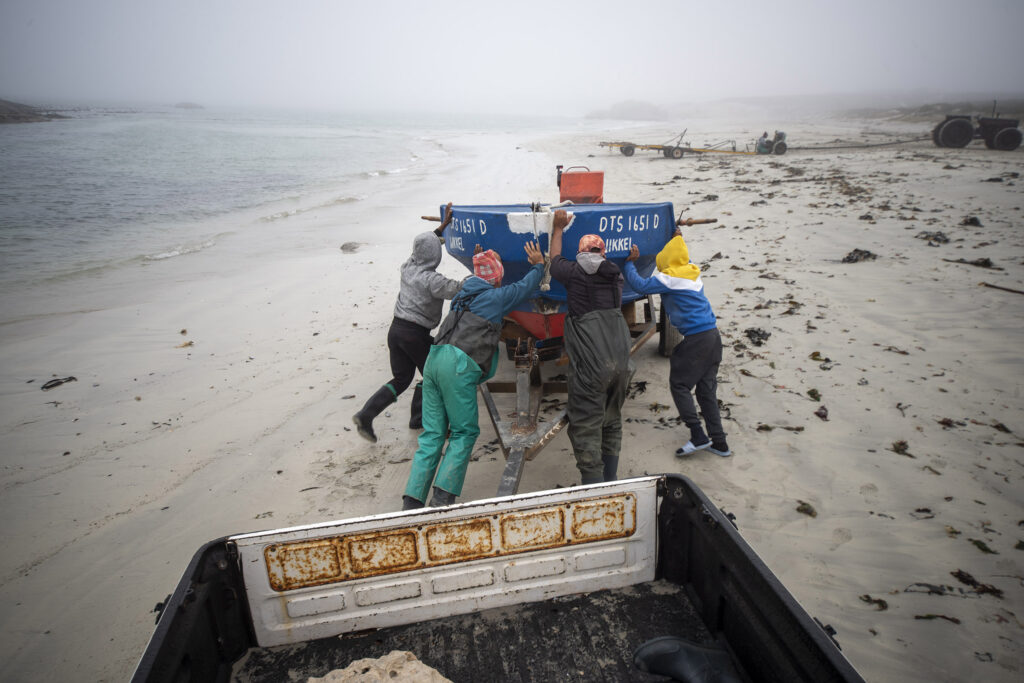 A group of fishers launch their dinghy ahead of a long day on the open sea. (David Harrison/M&G)
A group of fishers launch their dinghy ahead of a long day on the open sea. (David Harrison/M&G)
Usually the sea off Paternoster, a traditional fishing village on the West Coast, is cobalt blue. But on the mornings when the fog moves in and clouds hang low, the Atlantic Ocean is a vast ominous grey landscape.
“This is not the right time,” says Abrie hurriedly, while he helps three men unload a dinghy from a trailer connected to a battered bakkie.
Abrie has been a fisher for 45 years. “It’s my life,” he says.
Two of the men on his small boat are youngsters who are learning the ways of the sea.
Depending on the weather, they will be back after 2pm, or earlier. But conditions are not looking favourable.
From the shore, another four fishing boats are visible.
“Catch us when we come out,” Abrie says loudly above the sound of the waves, before jumping on his boat.
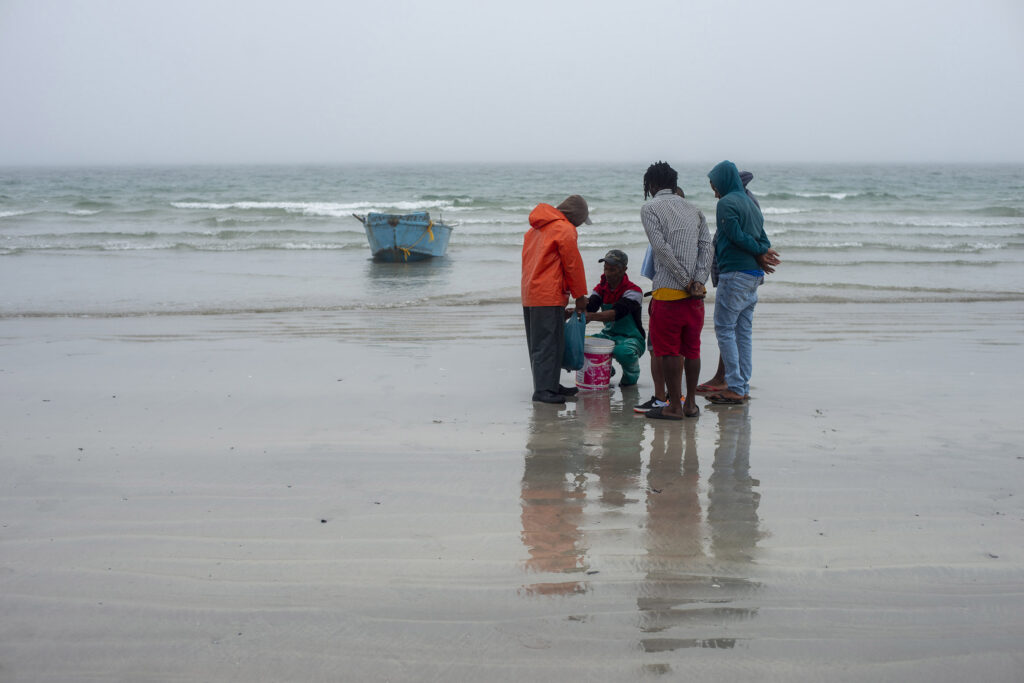 Poachers sorting crayfish and crayfish tails minutes before a buyer makes a purchase, along the shoreline of Paternoster, a traditional fishing village. (David Harrison/M&G)
Poachers sorting crayfish and crayfish tails minutes before a buyer makes a purchase, along the shoreline of Paternoster, a traditional fishing village. (David Harrison/M&G)
A few kilometres away from where Abrie and his team launched their boat, a group of men is huddled around a half-filled bucket of undersized crayfish and a large shopping bag of small crayfish tails.
“It can be any size,” says one of the men. “We sell them, for R5 loose,” another man chips in, referring to the tails. One crayfish costs R50, depending on its size.
Asked about the limit on catches, the men say there is none.
“No, we have a permit to catch every day, like a licence. You can then catch as many as you can. Maybe like R100kg per person. We go every day,” says one.
Another adds that it is the way they have been catching crayfish since they were young: “All my life, we have grown up so.”
Sometimes it is not worth going to sea because there are “too many other people”, they say. It is not worth it to only get five crayfish and 10 tails, “because you have to think about your [bait], your petrol and you must pay also,” says another, adding they work for a boss.
On average it costs R800 for one such excursion.
A white vehicle with a child in the back speeds towards the group of men. The bag of crayfish tails and bucket are hastily loaded before it speeds off again, leaving only its tracks.
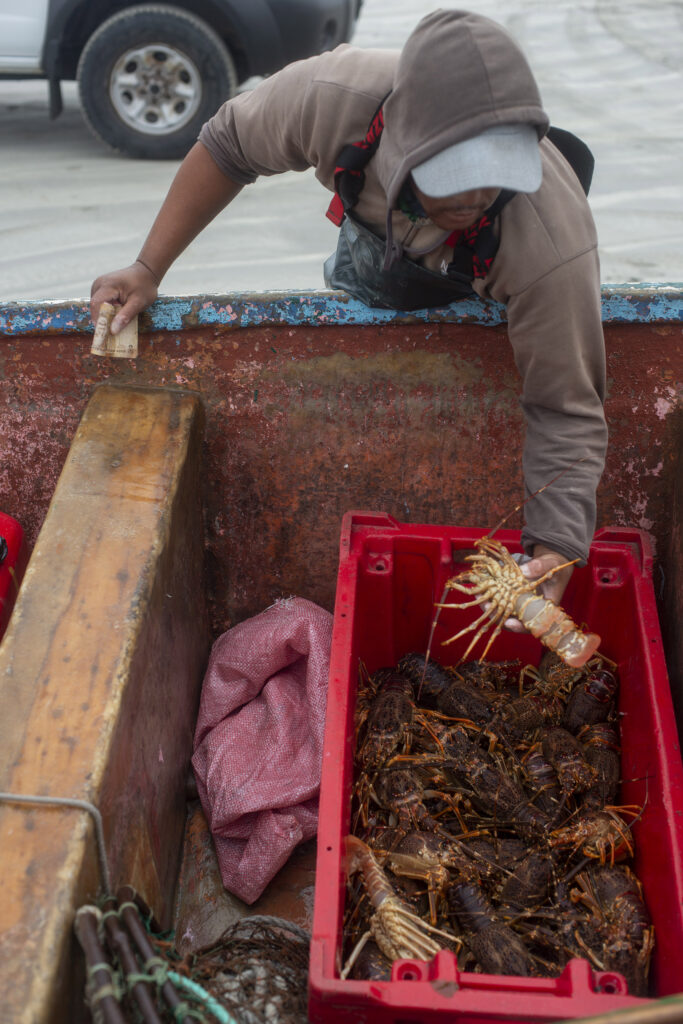 Legal-sized crayfish were caught in the same dinghy that the undersized crayfish were. (David Harrison/M&G)
Legal-sized crayfish were caught in the same dinghy that the undersized crayfish were. (David Harrison/M&G)
The two fishermen responsible for the catch are gleeful. The one tells the other, “nice catch” as they laugh and count their cash. The two men have been at sea since 7pm the previous night and only returned just after 7am. By the time they are finished, more than 23 trailers are on the beach, all unhooking boats.
“No, no, never,” answers one of the fishers when asked whether the crayfish supply will run dry. He adds their most recent catch is not the best, but the weather conditions were not favourable.
When do they plan to go out again?
“Tonight,” says one.
Adding to the maritime diversity are kelp harvesters. Battling the cool weather conditions since 5am, a group of about six men gather kelp only a short distance from the shoreline.
A tractor helps pull a blue boat out of the water to a waiting truck near heaps of kelp. The men say they harvest about three loads daily.
Earlier, the fishers claimed harvesting kelp upsets the ecosystem and destroys the habitat of fish. But the harvested kelp serves as food for aquaculture. The abalone farms do not harvest the kelp themselves but buy it from a contractor in Jacobsbaai, some 30km from Paternoster.
The farm has its own brooding stock, hatchery and nursery.
Overseeing the hatchery and nursery is Stephen Marthinus, who has worked at JSP for 18 years, four of those in his current position.
He meticulously manages the feeding patterns of the young molluscs, their growth, and the water temperature. The hatchery alone uses 30 000 litres of pumped sea water.
Marthinus says his brood stock consists of about 250 adult abalone from the ages of eight to more than 20 years. Although they produce more than six-million larvae per spawn, the maximum he ends up nursing are about 20 000 to 25 000, with the minimum being 8 000.
It takes five to six years for hatchlings to reach a suitable selling size.
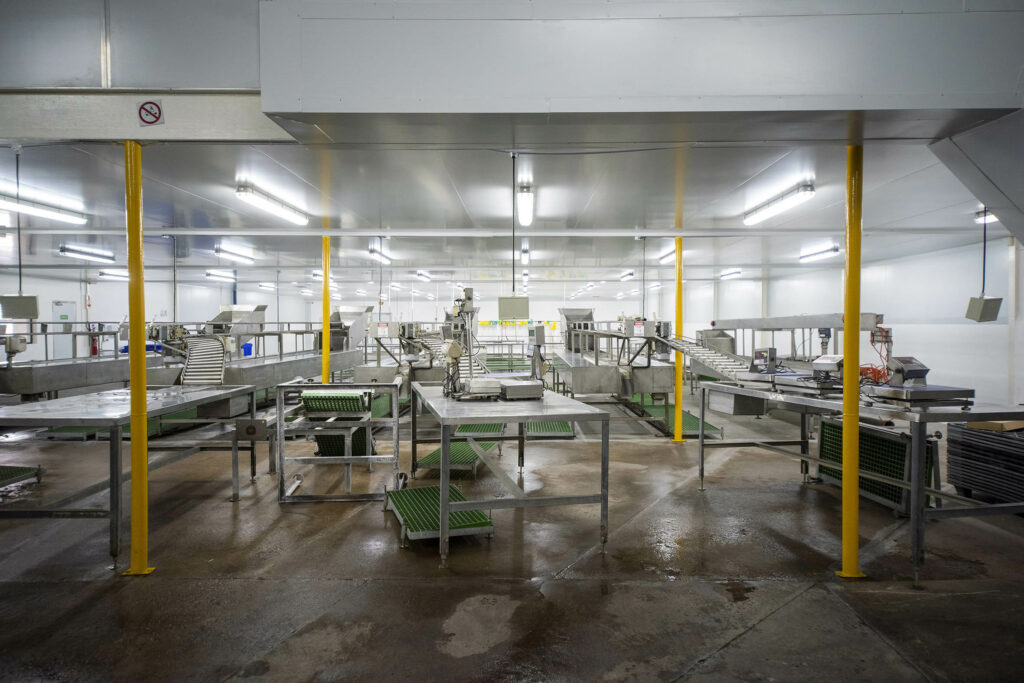 The fish factory of commercial fishing company Visco Visprodukte. At the time of this article, the factory was preparing to receive 16 tonnes of sardines, after three years of no supplies. (David Harrison/M&G)
The fish factory of commercial fishing company Visco Visprodukte. At the time of this article, the factory was preparing to receive 16 tonnes of sardines, after three years of no supplies. (David Harrison/M&G)
As a haven for fishermen, St Helena Bay has numerous fishing factories, such as Visco Visprodukte. For the first time in three years, the factory is ready to pack sardines.
Production manager Nina Maart could barely contain her excitement when she said the company was waiting for 16 tonnes of sardines from its Port Elizabeth boat at the start of February.
“There was a time the fish was just gone. There were few fish last year, but [they were] too small to catch,” said Maart.
Frederick Walters, a commercial fisher and co-owner of Visco Visprodukte, said there was nothing unusual in the elusiveness of the oily little fish.
In the 1970s sardines once stayed away for four years before returning, he said. It was just “nature running its course”.
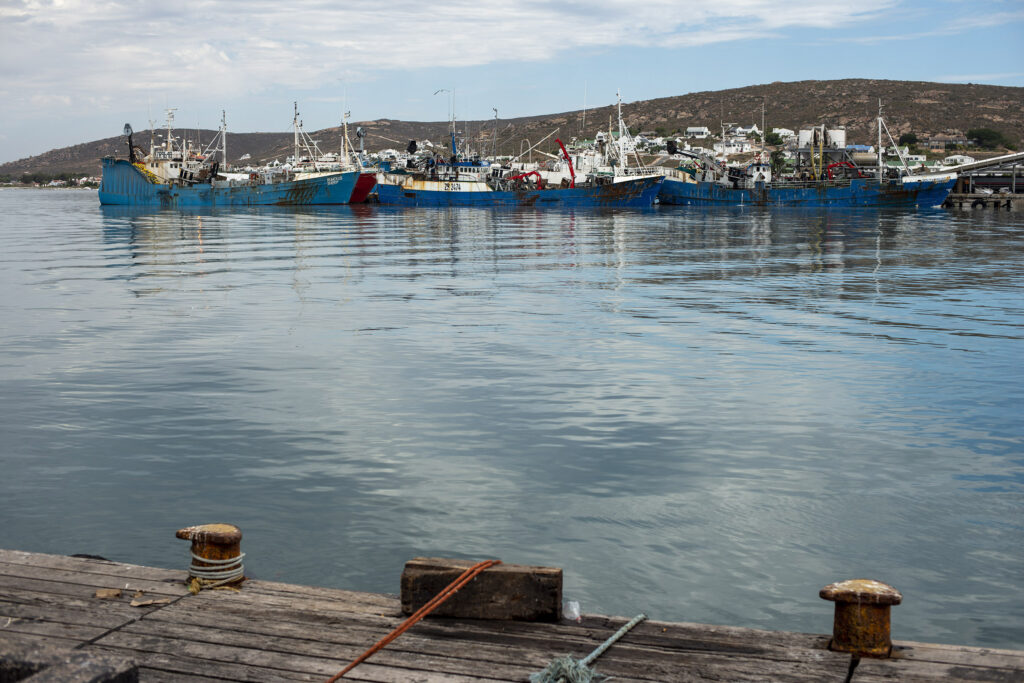 St Helena Bay Harbour. (David Harrison/M&G)
St Helena Bay Harbour. (David Harrison/M&G)
[/membership]